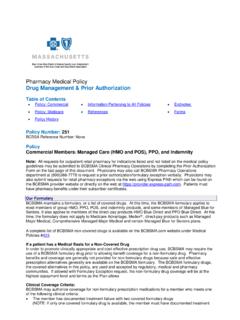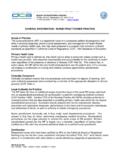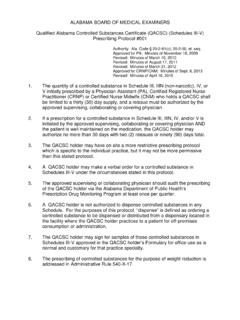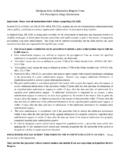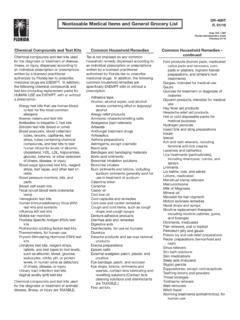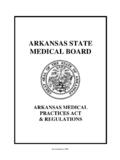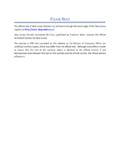Transcription of O.C.G.A. § 26-4-80.1 GEORGIA CODE Copyright 2011 …
1 GEORGIA CODE Copyright 2011 by The State of GEORGIA All rights reserved. ** Current Through the 2011 Regular Session ** ** Annotations Current Through April 22, 2011 ** TITLE 26. FOOD, DRUGS, AND COSMETICS CHAPTER 4. PHARMACISTS AND PHARMACIES ARTICLE 5. prescription DRUGS (2011) Use of security paper for hard copy prescription drug orders (a) Effective October 1, 2011, every hard copy prescription drug order for any Schedule II controlled substance written in this state by a practitioner must be written on security paper. (b) A pharmacist shall not fill a hard copy prescription drug order for any Schedule II controlled substance from a practitioner unless it is written on security paper, except that a pharmacist may provide emergency supplies in accordance with the board and other insurance contract requirements.
2 (c) If a hard copy of an electronic data prescription drug order for any Schedule II controlled substance is given directly to the patient, the manually signed hard copy prescription drug order must be on approved security paper that meets the requirements of paragraph ( ) of Code Section 26-4-5. (d) Practitioners shall employ reasonable safeguards to assure against theft or unauthorized use of security paper and shall promptly report to appropriate authorities any theft or unauthorized use. (e) All vendors shall have their security paper approved by the board prior to marketing or sale in this state.
3 (f) The board shall create a seal of approval that confirms that security paper contains all three industry recognized characteristics required by paragraph ( ) of Code Section 26-4-5. The seal shall be affixed to all security paper used in this state. (g) The board may adopt rules necessary for the administration of this Code section. (h) The security paper requirements in this Code section shall not apply to: (1) Prescriptions that are transmitted to the pharmacy by telephone, facsimile, or electronic means; or (2) Prescriptions written for inpatients of a hospital, outpatients of a hospital, residents of a nursing home, inpatients or residents of a mental health facility, or individuals incarcerated in a local, state, or federal correctional facility when the health care practitioner authorized to write prescriptions writes the order into the patient's medical or clinical record, the order is given directly to the pharmacy, and the patient never has the opportunity to handle the written order .
4 HISTORY: Code 1981, , enacted by Ga. L. 2011, p. 659, 5/SB 36. GEORGIA CODE Copyright 2011 by The State of GEORGIA All rights reserved. ** Current Through the 2011 Regular Session ** ** Annotations Current Through April 22, 2011 ** TITLE 26. FOOD, DRUGS, AND COSMETICS CHAPTER 4. PHARMACISTS AND PHARMACIES ARTICLE 1. GENERAL PROVISIONS 26-4-5 (2011) 26-4-5. Definitions As used in this chapter, the term: (1) "Administer" or "administration" means the provision of a unit dose of medication to an individual patient as a result of the order of an authorized practitioner of the healing arts.
5 (2) "Board of pharmacy" or "board" means the GEORGIA State Board of Pharmacy. (3) "Brand name drug" means the proprietary, specialty, or trade name used by a drug manufacturer for a generic drug and placed upon the drug, its container, label, or wrapping at the time of packaging. (4) "Compounding" means the preparation, mixing, assembling, packaging, or labeling of a drug or device as the result of a practitioner's prescription drug order or initiative based on the relationship between the practitioner, patient, and pharmacist in the course of professional practice or for the purpose of, or as an incident to, research, teaching, or chemical analysis and not for sale or dispensing.
6 Compounding also includes the preparation of drugs or devices in anticipation of prescription drug orders based on routine and regularly observed prescribing patterns. (5) "Confidential information" means information maintained by the pharmacist in the patient's records or which is communicated to the patient as part of patient counseling which is privileged and may be released only to the patient or, as the patient directs, to those practitioners and other pharmacists where, in the pharmacist's professional judgment, such release is necessary to protect the patient's health and well-being; and to such other persons or governmental agencies authorized by law to receive such confidential information.
7 (6) "Controlled substance" means a drug, substance, or immediate precursor in Schedules I through V of Code Sections 16-13-25 through 16-13-29, Schedules I through V of 21 Part 1308, or both. (7) "Dangerous drug" means any drug, substance, medicine, or medication as defined in Code Section 16-13-71. (8) "Deliver" or "delivery" means the actual, constructive, or attempted transfer of a drug or device from one person to another, whether or not for a consideration. (9) "Device" means an instrument, apparatus, contrivance, or other similar or related article, including any component part or accessory, which is required under federal law to bear the label, "Caution: federal or state law requires dispensing by or on the order of a physician.
8 " (10) "Dispense" or "dispensing" means the preparation and delivery of a drug or device to a patient, patient's caregiver, or patient's agent pursuant to a lawful order of a practitioner in a suitable container appropriately labeled for subsequent administration to, or use by, a patient. (11) "Distribute" means the delivery of a drug or device other than by administering or dispensing. ( ) "Division director" means the division director of the professional licensing boards division, as provided in Chapter 1 of Title 43. (12) "Drug" means: (A) Articles recognized as drugs in any official compendium, or supplement thereto, designated from time to time by the board for use in the diagnosis, cure, mitigation, treatment, or prevention of disease in humans or animals; (B) Articles intended for use in the diagnosis, cure, mitigation, treatment, or prevention of disease in humans or animals; (C) Articles, other than food, intended to affect the structure or any function of the body of humans or animals.
9 And (D) Articles intended for use as a component of any articles specified in subparagraph (A), (B), or (C) of this paragraph but does not include devices. (13) "Drug regimen review" includes but is not limited to the following activities: (A) Evaluation of any prescription drug order and patient record for: (i) Known allergies; (ii) Rational therapy-contraindications; (iii) Reasonable dose and route of administration; and (iv) Reasonable directions for use; (B) Evaluation of any prescription drug order and patient record for duplication of therapy.
10 (C) Evaluation of any prescription drug order and patient record for the following interactions: (i) Drug-drug; (ii) Drug-food; (iii) Drug-disease; and (iv) Adverse drug reactions; and (D) Evaluation of any prescription drug order and patient record for proper utilization, including overutilization or underutilization, and optimum therapeutic outcomes. (14) "Drug researcher" means a person, firm, corporation, agency, department, or other entity which handles, possesses, or utilizes controlled substances or dangerous drugs, as defined in Chapter 13 of Title 16, for purposes of conducting research, drug analysis, animal training, or drug education, as such purposes may be further defined by the board, and is not otherwise registered as a pharmacist, pharmacy, drug wholesaler, distributor, supplier, or medical practitioner.
